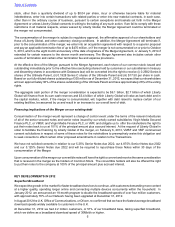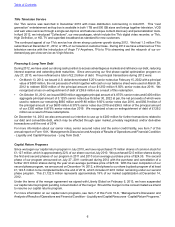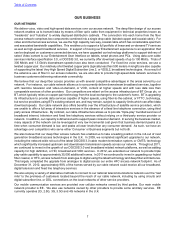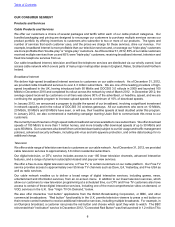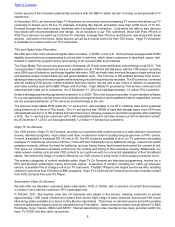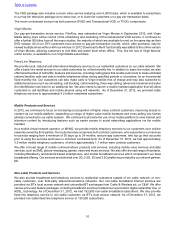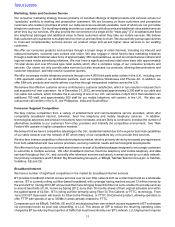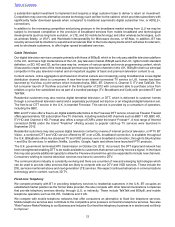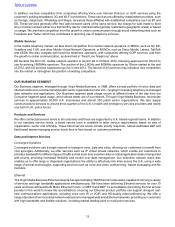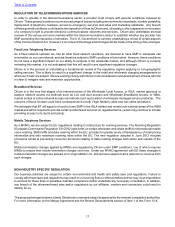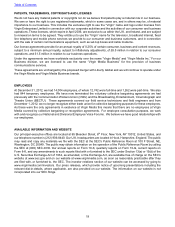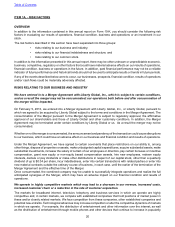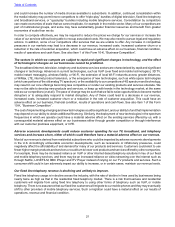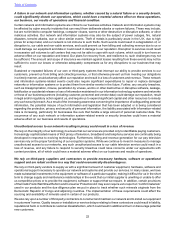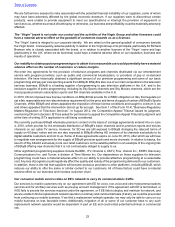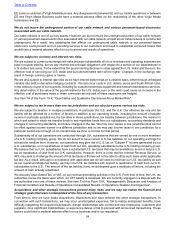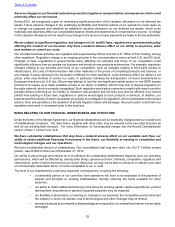Virgin Media 2012 Annual Report Download - page 16
Download and view the complete annual report
Please find page 16 of the 2012 Virgin Media annual report below. You can navigate through the pages in the report by either clicking on the pages listed below, or by using the keyword search tool below to find specific information within the annual report.
15
REGULATORY MATTERS
OVERVIEW
Legislative Framework
Our business activities are subject to the laws and regulations of the European Union, or EU, and the U.K. At an EU
level we are regulated by the “European Framework” which applies to all communication networks and services for
electronic communications including telecommunications (fixed and mobile), e-mail, access to the internet and content
related broadcasting. The purpose of the European Framework is to ensure more effective competition leading to
better rights and options for consumers. The European Framework comprises:
• Directive 2002/21 on a common regulatory framework for electronic communications networks and services;
• Directive 2002/20 on the authorization of electronic communications networks and services;
• Directive 2002/19 on access to, and interconnection of, electronic communications networks and associated
facilities; and
• Directive 2002/22 on universal service and users rights relating to electronic communications networks and
services.
These directives are supplemented by EU Directive 2002/58, concerning the processing of personal data and the
protection of privacy in the electronic communications sector.
In the U.K. the European Framework is implemented through the Communications Act 2003, or the Communications
Act, which regulates all forms of communications technology, whether used for telecommunications or broadcasting.
The Privacy and Electronic Communications Regulations 2003 implemented EU Directive 2002/58.
The European Framework was amended by Directives 2009/140/EC and 2009/136/EC, and changes have been made
to the Communications Act 2003 and the Wireless Telegraphy Act 2006 to implement these amendments in the United
Kingdom. The Privacy and Electronic Communications Regulations 2003 have also been amended by the Privacy and
Electronic Communications (Amendment) Regulations 2011.
We are also subject to regulation under the U.K. Broadcasting Acts 1990 and 1996 and other U.K. statutes and
subordinate legislation, including the Competition Act 1998 and the Enterprise Act 2002. On-demand programming is
regulated by the Authority for Television On-Demand, or ATVOD, under a co-regulatory regime with the U.K. Office of
Communications, or Ofcom. The regulatory regime for on-demand programming is derived from the Audiovisual Media
Services Directive.
U.K. Regulatory Authorities
Ofcom is the key regulatory authority for the communications sector in which we operate. It is responsible for furthering
the interests of consumers by promoting competition. In particular, Ofcom is responsible for regulating the behavior
of providers of electronic communications networks or services that have significant market power, or SMP, in identified
markets which may have a harmful influence on competition and consumers. A provider is deemed to have SMP if it
has a position of economic strength affording it the power to act independently of competitors and customers within a
given market. Currently, the U.K. Office of Fair Trading also has jurisdiction with respect to competition matters, but
there is reform anticipated in this area.
BROADBAND EXPANSION
The U.K. Government has decided not to implement the broadband tax proposed by the previous government. It
proposes instead to drive the deployment of superfast broadband and the provision of basic broadband to 90% of the
U.K. using money from the publicly funded BBC License Fee, under-spend from the Digital TV Switch Off Project and
private investment. Two key projects have been announced: the Broadband Delivery Program, which is focused on
delivering broadband to areas that the market will not serve of its own accord (mainly rural areas); and the Urban
Broadband Fund, which is aimed at establishing 'super connected' cities with fixed broadband capabilities of between
80-100Mbs and comprehensive mobile broadband coverage. We are playing an active role in helping Government
and industry understand how best this money might be spent to maximize the long term value of public investment in
broadband networks, and to ensure the money is allocated in a way that does not undermine private investments or
otherwise distort the market. This includes ensuring that State aid rules are strictly adhered to.
Table of Contents


